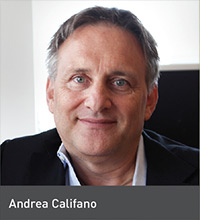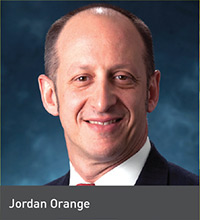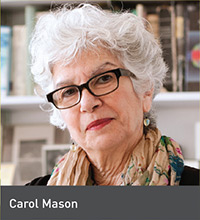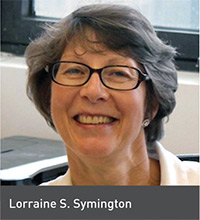News in Brief


Andrea Califano, Dr, and Jordan Orange, MD, PhD, have been elected to the National Academy of Medicine, one of the highest honors in the field of medicine. Dr. Califano, the Clyde and Helen Wu Professor of Chemical and Systems Biology and founding chair of the Department of Systems Biology, has developed innovative, systematic approaches to identifying the molecular factors that lead to cancer progression and drug resistance. Dr. Califano has pushed the conversation about cancer research away from a focus on gene mutations and toward the complex molecular networks that determine cancer cell behavior; his work focuses on master regulator proteins as critical drivers of cancer, though they are rarely mutated or differentially expressed. Dr. Orange, the Reuben S. Carpentier Professor of Pediatrics and chair of the Department of Pediatrics, has discovered previously unknown immune diseases in children and uncovered their underlying biological mechanisms, work that has allowed him to identify new therapeutic strategies for his patients and other patients with more common diseases. Dr. Orange is credited with defining a new class of diseases known as natural killer cell deficiencies, and work in his lab may lead to therapies that direct a patient’s natural killer cells to eliminate infections or cancer.
 Carol Mason, PhD, professor of pathology & cell biology, neuroscience, and ophthalmic science (in ophthalmology) and a principal investigator at Columbia’s Zuckerman Institute, has been elected to the National Academy of Sciences. Dr. Mason studies the brain circuitry of the visual system, focusing on how neurons in the developing brain extend axons from the eye to destinations deep in the brain. Her research has helped to reveal the processes that guide the growth and trajectory of the visual system’s neurons, opening up the possibility of repairing damage to the visual system caused by injury or disease.
Carol Mason, PhD, professor of pathology & cell biology, neuroscience, and ophthalmic science (in ophthalmology) and a principal investigator at Columbia’s Zuckerman Institute, has been elected to the National Academy of Sciences. Dr. Mason studies the brain circuitry of the visual system, focusing on how neurons in the developing brain extend axons from the eye to destinations deep in the brain. Her research has helped to reveal the processes that guide the growth and trajectory of the visual system’s neurons, opening up the possibility of repairing damage to the visual system caused by injury or disease.
 Lorraine S. Symington, PhD, the Harold S. Ginsberg Professor of Microbiology & Immunology and a member of the Herbert Irving Comprehensive Cancer Center, has been elected to the American Academy of Arts and Sciences. Dr. Symington studies how the cell repairs harmful DNA damage. When both strands of DNA break, homologous recombination is the main mechanism for repair. In recent years, the Symington lab has developed elegant genetic assays, coupled with physical analysis of recombination intermediates, to understand homologous recombination and to further characterize how members of the RAD52 group of genes are involved in the repair of double-strand breaks.
Lorraine S. Symington, PhD, the Harold S. Ginsberg Professor of Microbiology & Immunology and a member of the Herbert Irving Comprehensive Cancer Center, has been elected to the American Academy of Arts and Sciences. Dr. Symington studies how the cell repairs harmful DNA damage. When both strands of DNA break, homologous recombination is the main mechanism for repair. In recent years, the Symington lab has developed elegant genetic assays, coupled with physical analysis of recombination intermediates, to understand homologous recombination and to further characterize how members of the RAD52 group of genes are involved in the repair of double-strand breaks.
Ten VP&S faculty members received funds during the sixth round of grants from the President’s Global Innovation Fund, which awards grants for faculty members to leverage and engage the nine Columbia Global Centers to increase opportunities for research, teaching, and service. Recipients of Spring 2018 grants: Danielle Bajakian, MD (Surgery); Jeanine D’Armiento, MD, PhD (Medicine); Wafaa El-Sadr, MD (Medicine); Rishi Goyal, MD, PhD (Emergency Medicine); Andreas Hielscher, PhD (Radiology); Wilmot James, PhD (Pediatrics); Philip LaRussa, MD (Pediatrics); Craig Spencer, MD (Emergency Medicine); Lawrence Stanberry, MD, PhD (Pediatrics); and Annika Sweetland, DrPH (Psychiatry).
Columbia’s Faculty Diversity Initiative, now in its 13th year, has awarded grants to two VP&S faculty members through the Provost’s Grants Program for Junior Faculty Who Contribute to the Diversity Goals of the University. Spring 2018 grant awardees, selected via a competitive application process, included Lauren S. Chernick, MD (Pediatrics), and Edward Owusu-Ansah, PhD, (Physiology & Cellular Biophysics).
Velocity, Columbia’s Ride to End Cancer raised more than $1 million this year for cancer care and research. More than 800 people participated in the second year’s bike ride. Riders selected one of four routes, with distances ranging from 10 to 62.5 miles. Funds raised benefit the Herbert Irving Comprehensive Cancer Center.
- Log in to post comments

